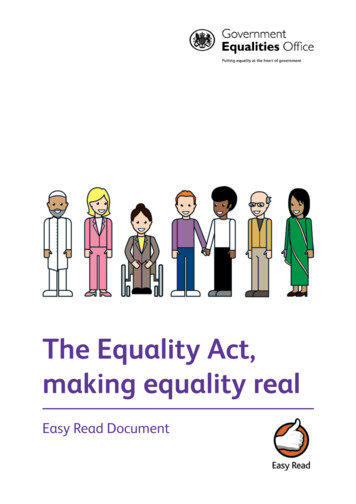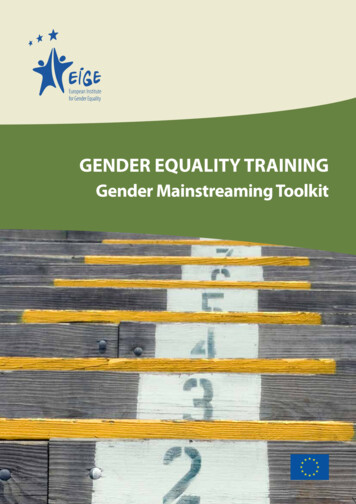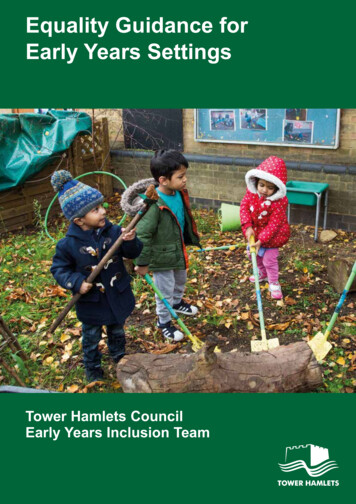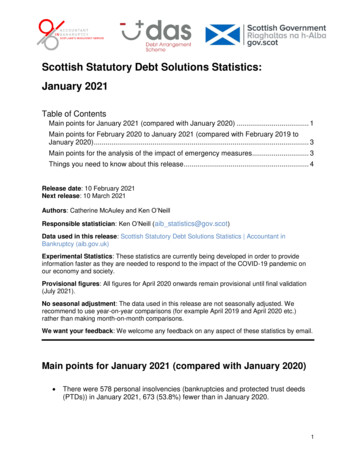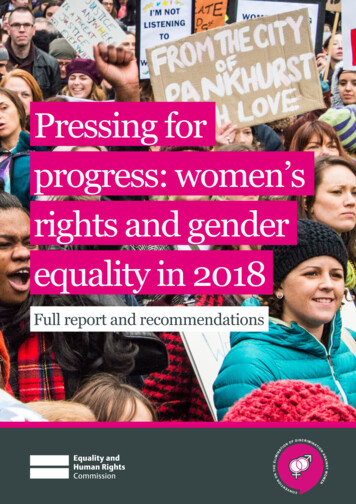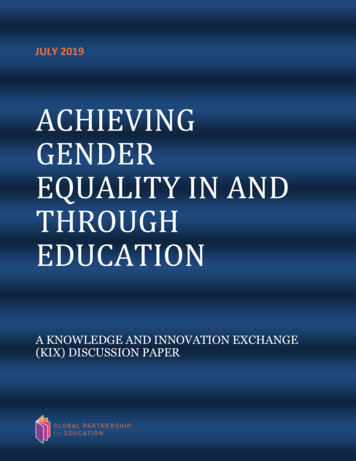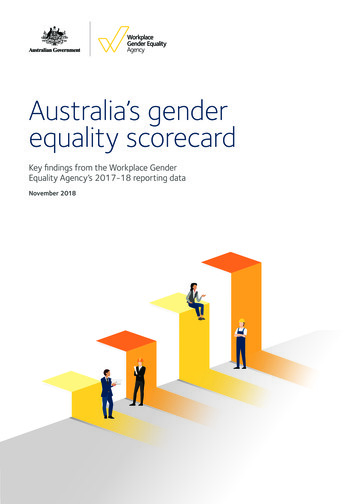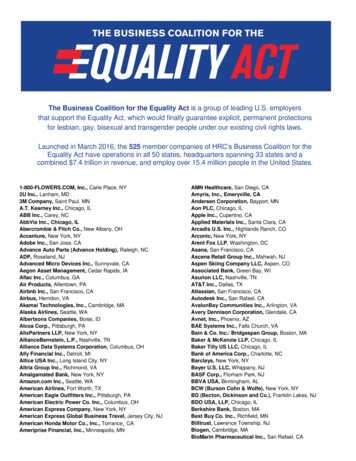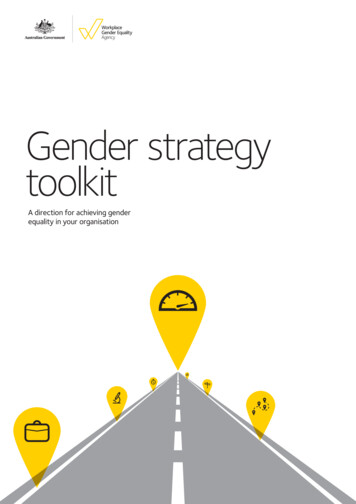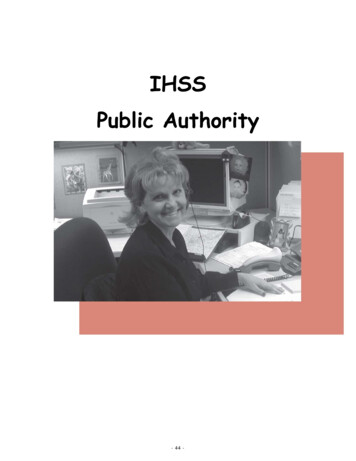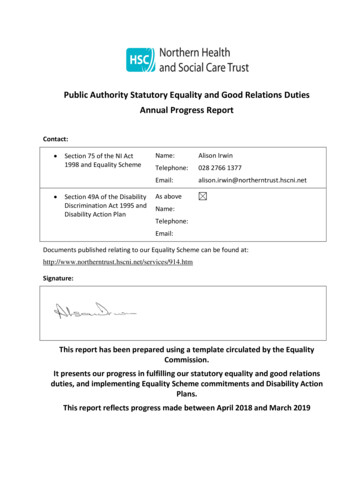
Transcription
Public Authority Statutory Equality and Good Relations DutiesAnnual Progress ReportContact: Section 75 of the NI Act1998 and Equality SchemeSection 49A of the DisabilityDiscrimination Act 1995 andDisability Action PlanName:Alison IrwinTelephone:028 2766 1377Email:alison.irwin@northerntrust.hscni.netAs aboveName:Telephone:Email:Documents published relating to our Equality Scheme can be found .htmSignature:This report has been prepared using a template circulated by the EqualityCommission.It presents our progress in fulfilling our statutory equality and good relationsduties, and implementing Equality Scheme commitments and Disability ActionPlans.This report reflects progress made between April 2018 and March 2019
PART A – Section 75 of the Northern Ireland Act 1998 and Equality SchemeSection 1: Equality and good relations outcomes, impacts and good practice1In , please provide examples of key policy/service delivery developments made by the publicauthority in this reporting period to better promote equality of opportunity and good relations;and the outcomes and improvements achieved.Please relate these to the implementation of your statutory equality and good relationsduties and Equality Scheme where appropriate.In preparing this Annual Progress Report on Section 75 of the Northern IrelandAct 1998 and Section 49A of the Disability Discrimination Order (DDO) the Trusthas used the template provided by the Equality Commission for Northern Ireland.Alongside this the Trust has developed ‘Equality News’ – a user friendlynewsletter for stakeholders and staff to highlight the extensive work than hastaken place across the Trust to promote equality of opportunity, good relationsand the disability duties.Part A of this report provides an overview of the work undertaken in compliancewith its Equality Scheme obligations and does not detail all of the work that theTrust carries out to promote equality of opportunity and good relations and toaddress inequalities. It is important to note that a key element of the Trust’sbusiness is to improve health and wellbeing and address inequalities.This year, the Trust has appended a detailed update of actions progressed in year1 (2018-2019) of the Equality Action Plan and Disability Action Plan – seeAppendix 1.Review of communications support servicesCommunication Support Services (British Sign language (BSL)/ Irish SignLanguage (ISL) interpreting) are required to ensure that deaf / hearing impairedpeople, who use BSL / ISL as their first language, are able to access health andsocial care services. Hard of Hearing people also require communication supportincluding lip speaking / electronic note taking to access services and those with adual sensory loss i.e. deafblind may require specialist interpreting services suchas hand on hand/ restricted visual frame interpreting. During the reporting periodthe has been on-going consultation and engagement with the deaf and hard ofhearing community through the Regional Communication Support Service(RCSS) Steering Group which continues to take forward the recommendations ofthe Health and Social Care Board (HSCB) review of communication supportservices for people who are deaf or hard of hearing. All of the constructive2
feedback received during the consultation will be taken into consideration by theAdvisory Group in the co-production of the new regional service model. Extensiveengagement with the deaf community is integral to the on-going development ofthis regional service.Supporting carersThe carer support programme offered in the Northern Trust aims to encouragecarers to have personal responsibility in their own health and wellbeing andpromote personal development to support them in the caring role. Following a coproduction day in 2018, Carers helped shape the events by co-delivering classesand sharing their experiences and supporting other carers through co-design ofresources and training. The number of sessions offered on the carer supportprogramme has increased from 61 sessions in 2017/18 to 95 sessions in 2018/19following use of co-production (an increase of 56%).In November 2018, the Trust commenced a new project in partnership withcommunity pharmacists. The aim of the project is to identify hidden carers in thecommunity by reaching out through the community pharmacist. The project willsee the Pharmacist initiating a conversation with the carer and signposting them tothe Carers Register in the Trust and Trust services. 55 pharmacies across theTrust have signed up to the project and to date 56 carers have been referred tothe Trust.WRAP – Wellness Recovery Action Plan is a programme to help peopleunderstand and manage their mental health and emotional wellbeing. Trust staffare now delivering specific carers WRAP co-delivered with a carer as part of thesupport programme across different areas of the Trust.Accessible communicationDuring the reporting period the Northern Trust made a total of 17, 888 requests forinterpreters through the Northern Ireland Regional Health and Social CareInterpreting Service. In year this represents an increase of over 4,600 requests.The top three languages requested within the Northern Trust during 2018/19 wereas 02118A total of 1054 appointments were supported with sign languageinterpreters and 169 documents were translated into minority languages.3
Agencies Supporting Ethnic Communities (ASEC)The Trust has worked in partnership ASEC (Agencies Supporting EthnicCommunities) and the Inter Ethnic Forum to ensure the Roma Community wassupported as a result of recent tensions in the Ballymena area. A factsheet hasbeen developed and cultural awareness training and ‘working well withinterpreters’ training was arranged for front line staff. Information was translatedfor health visiting and children’s services - produced firstly in Easy Read formatand then into Romanian and Bulgarian.Regional Physical and Sensory Disability StrategyThe end of the Regional and Physical and Sensory Disability Strategy wasmarked by a celebration on 3rd December 2018, on International Day of Personswith a Disability. The Making Communication Accessible guidance was featuredas one of the positive outcomes and a commitment was made to establish aRegional HSC Disability Forum to ensure that there is a strategic focus on thehealth and social care needs of people with a disability.Positive Action GroupThe Trust’s Day Opportunities services recently ran a job shadowing day whichgave an opportunity for 27 job seekers with a learning disability the chance toexperience jobs in various areas of the Trust. This was a very successful andwell-received initiative, not only from the viewpoint of those who availed of theopportunity, but also from Trust staff who facilitated the day.The Trust would now wish to build on the momentum and success of this tointroduce a programme whereby people with learning disabilities can be signedup to an employability programme. This programme would allow participants toundergo a training programme, largely within Corporate Support Services, wheresuccessful completion would translate into a guaranteed job. We would intend toextend this programme to other areas of work and other areas of disability in thefuture, following assessment of the success of this initial programme. The‘Positive Action Group’ has been established drawing on appropriatestakeholders from within and outside the Trust to oversee this piece of work.Staff Disability WorkshopOn 5 December the Trust held a workshop to talk with staff members about theirexperience of living and working with a disability or long term health condition.The objective of the workshop was to get direct feedback from staff who have adisability about their experience of working in the Trust and to find out how theycan best be supported in the workplace. The feedback received will shape how4
the Trusts supports staff with a disability in the future and we look forward toworking in partnership with you in taking the plan forward.Mental Health Charter/Every Customer CountsWe have signed up to two Equality Commission initiatives - the Mental HealthCharter and the disability access initiative ‘Every Customer Counts’. Along withthe other HSC Trusts the Trust has committed to the principles and objectives ofboth these Charters which can make a real difference to the lives of peoplefacing difficulties. Every Customer Counts prompts organisations to think abouthow they offer their services – and to do so from the perspective of someonewith a disability and by signing up to the Mental Health Charter, Trusts aredemonstrating commitment to helping employees who may be going through adifficult time. The Trust is actively seeking to promote healthy workplaces for allour employees through its Health and Wellbeing Strategies and to foster aculture where all staff feel valued, supported and listened to.2Please provide examples of outcomes and/or the impact of equality action plans/measures in 2018-19 (or append the plan with progress/examples identified).Please see Appendix 1 for a detailed update of actions progressed in year 1 (20182019) of the Equality Action Plan and Disability Action Plan.3Has the application of the Equality Scheme commitments resulted in any changes to policy,practice, procedures and/or service delivery areas during the 2018-19 reporting period?(tick one box only)No (goto Q.4)YesNot applicable (go to Q.4)Please provide any details and examples:The table below details how application of the Equality Scheme commitmentsresulted in any changes to policy, practice, procedures and/or service delivery areasduring 2018-19.Equality SchemeCommitmentActionDifference made forindividualsArrangements for assessing our compliance with S75 dutiesHave in place appropriatestructures and reportingmechanismsThe Trust has prioritisedSection 75 in all aspects of itsbusiness agenda and hasestablished a range ofgovernance, managementand reporting mechanisms5Section 75 duties integral toTrust’s AssuranceFramework. Trust seniorteams aware of and complywith statutory requirementsduring decision making.
that reflect this. The Trust’sEngagement, Experience andEquality Group (Triple EG).Triple EG reports directly tothe Trust’s Assurance andImprovement Group whichreports through the ExecutiveTeam to Trust Board.Ensure S75 duties aremainstreamed within theTrustMembership of theEngagement, Experience andEquality Group (Triple EG)includes Trust Directors whoare responsible for themainstreaming of equalityduties across their Divisions.Divisional Equality Leadshave been identified toensure equality is embeddedacross the organisation.Individuals aware of theTrust’s commitment toequality duties.Trust staff aware of equalityduties and Trust commitmentto not only avoidingdiscrimination but also topursuing good practice,embracing diversity andpromoting good relations.The Trust’s Equality Unitprovides staff with theinformation, training andresources to support staff tohave the appropriate level ofknowledge, expertise and skillto mainstream S75 duties.Prepare Section 75 AnnualProgress Report (APR) andinclude section in Trust’sown Annual Report.The regional Equality, GoodRelations and Human Rights;Making a DifferenceeLearning programme ismandatory and compliance ismonitored twice each year.Annual Progress Reportsupported by “Equality News”to ensure updates available ina more accessible format.Equality Matters sectionincluded in the Trust’s AnnualReport.All consultees sent copy ofnewsletter and informed ofavailability of progress report- improving awareness ofTrust’s S75 duties andoutcomes of workprogramme.Action PlanDevelopment of ActionBased Plan to includeperformance indicators andtimescales. Aligned tocorporate and businessplanning cycleFive year S75 Equality ActionPlan developed in partnershipwith representativeorganisations. See Appendix1 for actions progressed inyear 1.6Its implementation isintended to have a positiveimpact on S75 groups.
Arrangements for consultingConsultation list reviewedand updatedConsultation list continuallyreviewed.New consultees added to theconsultation list on an ongoing basis.Training re.ConsultationCo-production workshopsheld with all operationalDivisions to developframework for ongoingengagement.Offered additional insightsand tools for engaging withothers on servicedevelopment andimprovement projects,working to a co-designethos.In making any decision withrespect to a policy adoptedor proposed to be adopted,take into account anyassessment andconsultation carried out inrelation to the policyPolicy Development Processensures engagement andconsultation.Views of representationgroups and individualsconsidered during decisionmaking process.Provide feedback report toconsultees in timely mannerin formats suited toconsulteesAll consultees involved inTrust projects receiveddetailed feedback reports.Reports available on staffnetand website.Representative groups andindividuals informed of howtheir feedback influenced thedecision made.ScreeningRevise screening templateand accompanyingguidance notes.Publish reports quarterlyand in accessible formatson request.Publishing of EQIA reports.Trust policy developmentprocess ensures all Trustpolicies are screened. Allpolicies approved during thereporting period were subjectto S75 screening andappropriate consultation.During the reporting periodthe Trust screened 92policies and proposals.All quarterly reports for thereporting period were madeavailable on the Trust’swebsite.No EQIAs completedTransparent decision makingprocess for consultees andimpact on S75 groupsidentified during policydevelopment process.Screening outcomesavailable to the public forconsideration.MonitoringReview of monitoringinformationThe Trust continues tomonitor staff by Section 75categories and this has beenenhanced by HRPTS SelfService functions. During the7Increased understanding ofthe make-up of the workforceto ensure promotion ofequality of opportunity andbetter information to identify
reporting period thismonitoring information wasassessed for S75 screenings.any potential impact.Staff TrainingDraw up a detailed trainingplanDuring reporting period,implementation of the Trust’sEquality Training Programmecontinued.The regional Equality, GoodRelations and Human Rights:Making a DifferenceProgramme has been rolledout across the Trust viaBroadcast and Staffnet andcompliance is monitored.Focused trainingAt the end of March 2019,3808 staff had completedthe e-learning training.Improved access to equality,good relations and humanrights training and diversitytraining through availability ofmore condensed trainingpackage for staff andmanagers as well as theavailability of a trainingmanual for those who do nothave access to computers.During the reporting periodthe Trust continued to provideface to face focused disabilityequality training, co-producedand co-delivered by disabledpeople who are members ofDisability Consultation Panel.Training delivered by therepresentative groups andindividuals resulted in verypositive feedback.In addition to this specialistdisability equality training wasdelivered to staff in Estates.Targeted training deliveredby specialist facilitatorenhanced the skills of Truststaff.Cultural awareness trainingand working well withinterpreters training wasdelivered to front line staff toensure they had thenecessary knowledge tosupport the Romacommunity.During the year the Trust heldspecialised coproductionworkshops to support thedevelopment of acoproduction culture attendedby 139 service users, carersand staff64 staff attended deafawareness sessions heldacross organisation.8Specific training improvedawareness, knowledge andsensitivity for professionalscoming into contact withclient/service users fromother minority ethniccommunities.Targeted training deliveredby specialist facilitatorenhanced the skills of Truststaff.Deaf and hard of hearingservice users and carersprovided with the appropriatecommunication support.
Arrangements for ensuring and assessing public access to information and services weprovideEnsure information wedisseminate and serviceswe provide are fullyaccessible to all parts of thecommunity in NorthernIrelandInformation is provided inalternative formats on requestand Trust’s website has beendesigned to ensureaccessibility.Improved access toinformation and services forequality groups – specificallythose whose first language isnot English and people witha disability.During reporting period a totalof 17,888 requests for face toface interpreting made toNIHSCIS, which is anincrease of over4,600requests.Provide information inalternative formats onrequestDuring the reporting period atotal of 1054 appointmentswere supported with signlanguage interpreting support.169 documents translatedinto minority languagesduring reporting period.All minutes of DisabilityConsultation Panel providedon disk or Braille andminutes of Learning DisabilityPanel provided in Easy read.Provide interpreters andsign language interpretersOn-going provision ofcommunication support. 1054appointments supported withSign Language Interpreter.17,888 interpreters wererequested from NIHSCIS.Extensive use of telephoneinterpreting.Information provided inalternative formats toincrease understanding,ensure effectivecommunication andimproved access to services.Service users and staffsupported to ensure goodgovernance in informationprovision andcommunication.Complaints ProcedureHow complaints are raised,timetable for responding etcNo S75 complaints receivedAny other measures proposed in equality schemeWork closely with otherpublic authorities toexchange learning and bestpracticeDuring reporting period theTrust participated in RegionalEquality and Human RightsSteering Group and RegionalEquality Leads meetings.9More effective use ofresources and consistentapproach across health andsocial care
Liaise closely with the ECNIto ensure that progress onthe implementation of ourEquality Scheme ismaintained3aDuring reporting period theTrust met regularly with ECNIon S75 implementation.Ensures effective use ofresources and S75implementation.With regard to the change(s) made to policies, practices or procedures and/or servicedelivery areas, what difference was made, or will be made, for individuals, i.e. the impacton those according to Section 75 category?Please provide any details and examples:Please see third column in above table. It is important to note that the screening ofpolicies, practices or procedures and/or service delivery areas has resulted in manyconsiderations on how to promote equality of opportunity and good relations. Forexample there is better engagement with those affected by policies and decisionsincluding with service users and carers. Through the screening process, decisionmakers are more aware of the need for effective and accessible communication. It isimportant to note that staff affected by policies and decisions in relation tomanagement of change are engaged with to ensure that any adverse impact can bemitigated as required. This is done on an on-going basis and because ofconfidentiality issues relating to reasonable adjustments that are made thisinformation is not included in the screening templates.3bWhat aspect of the Equality Scheme prompted or led to the change(s)? (tick all that apply)As a result of the organisation’s screening of a policy (please give details):Examples provided aboveAs a result of what was identified through the EQIA and consultation exercise (pleasegive details):No Equality Impact Assessments carried out during reporting period.As a result of analysis from monitoring the impact (please give details):The Trust continues to monitor its workforce across the 9 equality categories.This monitoring information is used for all S75 screenings of proposals thatimpact on staff. This supports the assessment of impact and the identificationof potential adverse impact.As a result of changes to access to information and services (please specify and givedetails):10
As result of the increase in the Roma community in the Trust area severaldocuments were translated first into easy read format and then into Romanianand Bulgarian to ensure accessibility. These documents have been madeavailable across health and social care.The provision of interpreters and translated accessible information continuesto result in effective information provision and better communication insituations where a clear understanding is required.As a result of the Trust’s on-going engagement with carers it has updated theinformation available to support carers in their caring role as follows. Carer register form – this year again the carers register form has beenupdated and rebranded to encourage carers across all Programmes ofCare to sign up to the carers register (a contact list of all carers tocommunicate effectively throughout the year)Carer newsletter – two issues were circulated in 2018/2019 withincreased content to keep carers up to date with what is happening inthe Trust and wider community. Carers now contribute to thenewsletter with a “carers column” to increase the connection with othercarers.Carer Pathway Steering Group – the focus this year has been towardsimproving access to services for carers and simplifying the contact withthe Trust. The Steering Group is made up of carers, HSC staff andcommunity and voluntary sector organisations. The Group is carer ledand the carer membership endorses any suggestions of support forcarers to ensure family carers receive the right support.Co-delivering carer support – whilst the support programme has beenco-designed by carers elements of the programme are also codelivered by carers such as the WRAP classes to give participants alived experience perspective.Other (please specify and give details):11
Section 2: Progress on Equality Scheme commitments and action plans/measuresArrangements for assessing compliance (Model Equality Scheme Chapter 2)4Were the Section 75 statutory duties integrated within job descriptions during the 2018-19reporting period? (tick one box only)Yes, organisation wideYes, some departments/jobsNo, this is not an Equality Scheme commitmentNo, this is scheduled for later in the Equality Scheme, or has already been doneNot applicablePlease provide any details and examples:All staff are required to comply with Trust policy including the Equality Scheme and theEqual Opportunities Policy.5Were the Section 75 statutory duties integrated within performance plans during the 2018-19reporting period? (tick one box only)Yes, organisation wideYes, some departments/jobsNo, this is not an Equality Scheme commitmentNo, this is scheduled for later in the Equality Scheme, or has already been doneNot applicablePlease provide any details and examples:The national Knowledge and Skills Framework (KSF) continues to be the process linkedto annual development reviews of all Trust staff and personal development plans.Equality and diversity is one of the 6 Core Dimensions and it reflects a key aspect of alljobs and underpins all dimensions in the KSF. During the reporting period the Trustcontinued to focus on the completion of appraisals to ensure staff have the knowledgeand skills they need to do their job and that key areas for development are identified.Equality training is mandatory in the Trust and attendance at/completion of all mandatorytraining is determined through the appraisal process.12
In the 2018-19 reporting period were objectives/ targets/ performance measures relating to theSection 75 statutory duties integrated into corporate plans, strategic planning and/oroperational business plans? (tick all that apply)Yes, through the work to prepare or develop the new corporate planYes, through organisation wide annual business planningYes, in some departments/jobsNo, these are already mainstreamed through the organisation’s ongoing corporate planNo, the organisation’s planning cycle does not coincide with this 2016-17 reportNot applicablePlease provide any details and examples:The Trust continues to prioritise Section 75 within all aspects of its business agenda andhas established a range of governance, management and reporting mechanisms toreflect this. The Trust’s Equality Unit sits within the Strategic Development and BusinessServices Division and supports all Trust Divisions to ensure Section 75 is mainstreamedand integral to planning processes. Objectives and targets relating to the Trust’s dutiesunder Section 75 are built into its corporate and directorate planning processes. TheTrust has set appropriate objectives and targets for individual responsible officers.The Trust’s Engagement, Experience and Equality Group (Triple EG) ensurescompliance with and mainstreaming of Section 75 duties. The Group seeks assurancethat the Trust is compliant with Equality, including Section 75 of the Northern Ireland Act1998, the Human Rights Act 1998 and Section 49a of the Disability Discrimination Actand in doing so ensures that the above is embedded in decision making. The Group ischaired by the Deputy Chief Executive and membership includes Trust Director and Nonexecutive Directors.Equality action plans/measures7Within the 2018-19 reporting period, please indicate the number of:Actionscompleted:15Actions ongoing: 7Actions tocommence:Please provide any details and examples (in addition to question 2):Examples provided in Appendix 11313
8Please give details of changes or amendments made to the equality action plan/measures duringthe 2018-19 reporting period (points not identified in an appended plan):Detailed update provided in Appendix 19In reviewing progress on the equality action plan/action measures during the 2018-19 reportingperiod, the following have been identified: (tick all that apply)Continuing action(s), to progress the next stage addressing the known inequalityAction(s) to address the known inequality in a different wayAction(s) to address newly identified inequalities/recently prioritised inequalitiesMeasures to address a prioritised inequality have been completedArrangements for consulting (Model Equality Scheme Chapter 3)10Following the initial notification of consultations, a targeted approach was taken – andconsultation with those for whom the issue was of particular relevance: (tick one box only)All the time11SometimesNeverPlease provide any details and examples of good practice in consultation during the 2018-19reporting period, on matters relevant (e.g. the development of a policy that has been screenedin) to the need to promote equality of opportunity and/or the desirability of promoting goodrelations:The Trust recognises the importance of proper and timely consultation as an integral partof fulfilling its Section 75 obligations when making decisions and planning services. Forall public consultations the details are sent out to over 1,500 individuals, groups andorganisation on the Trust’s Consultation Database. Consultation documents are madeavailable on the Trust’s website with the consultation document is available in alternativeformats. Following consultation, a detailed consultation feedback report is drafted andtime is taken to consider all the responses. All of those who provided feedback andparticipated in the consultation process are informed of how their feedback influenced thefinal decisions. During the reporting period no public consultations were carried out.As well as having a duty to involve, the Trust recognises the importance and benefit ofeffective engagement and communication with our local communities.The following outlines the work we have done to support personal and public involvementand co-production to bring about a positive change in our culture.14
Acute Co-Production PartnershipThe Acute Co-Production Partnership continues to amplify the voices of our serviceusers/carers and the community to enable effective and meaningful involvement indecision making which may affect our services now and in the future. The AcuteDivisions are passionate about making sure the views and preferences of service usersshape how our services are developed. Members of the Acute Co-productionPartnership, staff, service users and carers had a workshop in March 2019 to discusssome specific pieces of upcoming service development and improvement work relating toendoscopy services and discharge procedures for patients. The workshop enabled us towork in groups to identify starting points for co-production approaches and discuss theimprovement projects in more detail. Members of the Partnership are now working withTrust staff on a range of improvement projects.The Learning Disability Service User ForumAfter consulting with adults with a learning disability who using Trust services to seekviews on the best way forward to engage and influence service design and delivery wehave established a Trust-wide User Forum. In partnership with Compass AdvocacyNetwork (CAN) we marketed the Forum and recruited its membership. Recruitmentinvolved an inclusive application and selection methodology to make sure we could reachout to all service user stakeholders across the range of localities, services anddemographics and at different life stages. The first meeting of the Forum was in February2017 where the terms of reference was produced and agreed by members.The Service User Forum gives a formal voice to people with a learning disability to saywhat they want and how they want it. The Forum is facilitated by an advocacyorganisation which supports members to participate in meetings through capacitybuilding. The Forum provides a strong and lively platform to ensure the voice of peoplewith a learning disability is heard. This year the Forum has co-designed a logo which willbe used to evidence the work that the Forum has been involved in. The logo representsdiversity, working together and the importance of being valued and hav
Language (ISL) interpreting) are required to ensure that deaf / hearing impaired people, who use BSL / ISL as their first language, are able to access health and social care services. Hard of Hearing people also require communication support including lip speaking / electronic note taking to access services and those with a
